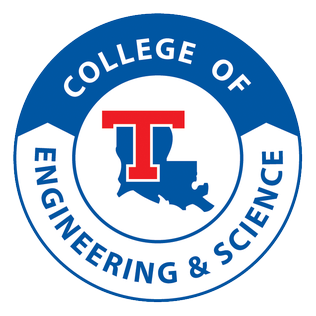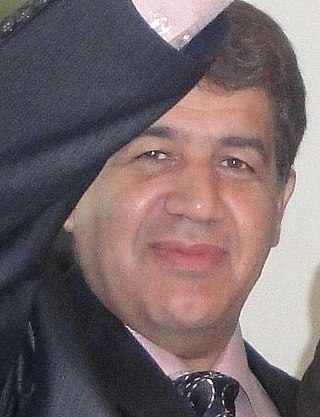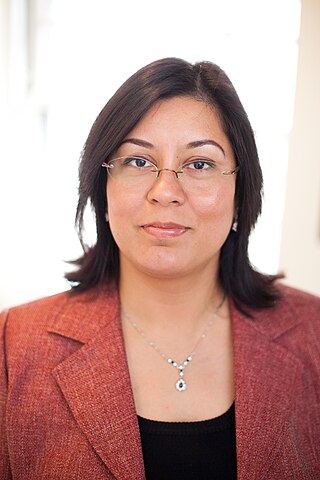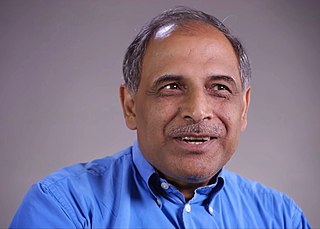
Hydrology is the scientific study of the movement, distribution, and management of water on Earth and other planets, including the water cycle, water resources, and drainage basin sustainability. A practitioner of hydrology is called a hydrologist. Hydrologists are scientists studying earth or environmental science, civil or environmental engineering, and physical geography. Using various analytical methods and scientific techniques, they collect and analyze data to help solve water related problems such as environmental preservation, natural disasters, and water management.

The American Society of Civil Engineers (ASCE) is a tax-exempt professional body founded in 1852 to represent members of the civil engineering profession worldwide. Headquartered in Reston, Virginia, it is the oldest national engineering society in the United States. Its constitution was based on the older Boston Society of Civil Engineers from 1848.

Gobichettipalayam Vasudevan "G. V." Loganathan was an Indian-American professor, who, at the time of his death, was a professor in the Department of Civil and Environmental engineering, part of the College of Engineering at Virginia Tech, United States.
Bruce Russell Ellingwood is an American civil engineer and a Professor of Civil and Environmental Engineering at the Colorado State University.

Marc Edwards is a civil engineering/environmental engineer and the Charles Edward Via Professor of Civil and Environmental Engineering at Virginia Tech. An expert on water treatment and corrosion, Edwards's research on elevated lead levels in Washington, DC's municipal water supply gained national attention, changed the city's recommendations on water use in homes with lead service pipes, and caused the Centers for Disease Control and Prevention to admit to publishing a report so rife with errors that a congressional investigation called it "scientifically indefensible." He is considered one of the world's leading experts in water corrosion in home plumbing, and a nationally recognized expert on copper corrosion. He is also one of the whistleblowers in the Flint water crisis, along with Dr. Mona Hanna-Attisha.
The following outline is provided as an overview of and topical guide to hydrology:

The College of Engineering and Science (COES) is one of five colleges at Louisiana Tech University, a public research university in Ruston, Louisiana. The roots of the college date back to the founding of Louisiana Tech in 1894 when the Department of Mechanics was created. Today, the college includes twenty-five degree-granting programs: fourteen undergraduate, seven master's, and four doctoral programs. College programs are located on the Louisiana Tech campus in Ruston, Louisiana. In addition, courses are offered at the CenturyLink Headquarters in Monroe, Louisiana, at Barksdale Air Force Base, in Bossier City, Louisiana, and at the Louisiana Tech Shreveport Center in Shreveport, Louisiana.

Saeid Eslamian is a full professor of hydrology and water resources sustainability at Isfahan University of Technology in the Department of Water Engineering. His research focuses mainly on statistical and environmental hydrology and climate change. In particular, he is working on forecasting natural hazards including flood, drought, storm, wind, pollution toward a sustainable environment. He is now the Director of Excellence in risk management and natural hazards. Formerly, he was a visiting professor at Princeton University, United States, university of ETH Zurich, Switzerland and McGill University, Montreal, Quebec, Canada. He has contributed to more than 600 publications in journals, books, or as technical reports. He is the founder and chief editor of International Journal of Hydrology Science and Technology. Currently, he has been the author of about 210 books and book chapters. Eslamian is the editorial board member and reviewer of about 100 Web of Science (ISI) Journals. Saeid is the editor of Journal of Hydrology (Elsevier)Journal of Hydrology, Ecohydrology and Hydrobiology (Elsevier), Journal of the Saudi Society of Agricultural Sciences (Elsevier), Journal of Water Reuse and Desalination (IWA).
Soroosh Sorooshian is an Iranian-born American civil engineer, and educator. He is a distinguished professor of civil and environmental engineering at the University of California, Irvine and currently serving as the Director of the Center for Hydrometeorology and Remote Sensing.

Vijay P. Singh is a Distinguished Professor and a Regents Professor, and holds the Caroline and William N. Lehrer Distinguished Chair in Water Engineering at Texas A&M University. His research interests include Surface-water Hydrology, Groundwater Hydrology, Hydraulics, Irrigation Engineering, Environmental Quality, and Water Resources.

Murugesu Sivapalan is an Australian-American engineer and hydrologist of Sri Lankan Tamil origin and a world leader in the area of catchment hydrology. He is currently the Chester and Helen Siess Endowed Professor of Civil and Environmental Engineering, and professor of Geography & Geographic Information Science, at the University of Illinois, Urbana-Champaign. Sivapalan is widely recognized for his fundamental research on scale issues in hydrological modeling, his leadership of global initiatives aimed at hydrologic predictions in ungauged basins, and for his role in launching the new sub-field of socio-hydrology.
Miguel A. Marino is an American engineer, currently the Distinguished Professor Emeritus of Hydrologic Sciences, Civil and Environmental Engineering and Biological & Agricultural Engineering at University of California, Davis, and also a published author. He was honored as a Distinguished Member of the American Society of Civil Engineers (ASCE) in 1999, and a Life Member in 2005, as well as being the ASCE's Editor of its journal Journal of Water Resources Planning and Management in 1984-88.
Elfatih Ali Babiker Eltahir is a Sudanese -American Professor of Civil and Environmental Engineering, H.M. King Bhumibol Professor of Hydrology and Climate, and Director of the MIT-UM6P Research Program at the Massachusetts Institute of Technology.
Efi Foufoula-Georgiou is a Distinguished Professor in the Civil and Environmental Engineering department at the University of California, Irvine. She is well known for her research on the applications of wavelet analysis in the fields of hydrology and geophysics and her many contributions to academic journals and national committees.

Shaily Mahendra is an Indian-American civil and environmental engineer. She is an associate professor of civil and environmental engineering at the University of California, Los Angeles (UCLA).

Reginald DesRoches is an American civil engineer who, as of July 1, 2022, serves as the president at Rice University. From 2020 until 2022, he served as provost of Rice. Earlier, beginning in 2017, he was the dean of engineering at Rice's school of engineering, and from 2012 to 2017, DesRoches held the Karen and John Huff Chair at the Georgia Institute of Technology.

Enrique R. Vivoni is a Puerto Rican scientist and engineer specializing in hydrology who studies the interactions of water throughout the atmosphere, biosphere, and lithosphere. His research is focused on the southwestern United States and Mexico for the purpose of improving water management in urban and rural settings.

Shafiqul Islam is a Bangladeshi American researcher, academic and author. He is a Professor of Civil and Environmental Engineering and Professor of Water Diplomacy at Tufts University. He serves as the Director of Water Diplomacy. He is also the Founding Editor of the Water Diplomacy Series.
Dennis P. Lettenmaier is an American hydrologist.

Upmanu Lall is an Indian-American engineer and the Alan and Carol Silberstein Professor of Engineering at Columbia University. He serves as Director of the Columbia Water Center. Lall studies water scarcity and how to predict and mitigate floods. He was named an American Geophysical Union Fellow in 2017 and their Walter Langbein Lecturer in 2022. He was elected a fellow of the American Association for the Advancement of Science in 2018, and has received the Arid Lands Hydrology and the Ven Te Chow Awards from the American Society of Civil Engineers. In April 2021 he was named to the “Hot List of the world’s 1,000 top climate scientists” by Reuters.













